Articles of 2009
Oscar Winner Budd Schulberg, 95, Passes

NEW YORK — I could tell from the choking sound on the other end of the line that the news wasn't going to be good. It took him awhile, and when he finally got it out, the best his son could manage was “He's gone…”
Budd Schulberg was 95 years old and had been in ill health for several months, so it was hardly unexpected, but the unsettling moment arrived late Wednesday afternoon when Benn phoned to tell me his father had passed away an hour earlier. Budd was a giant in our field, and a giant in many others as well. He was the only man ever to have both won an Oscar and been inducted into the International Boxing Hall of Fame, but he was also my dear friend of many years, and I miss him already.
* * *
Budd Schulberg was 15 years old in 1929 when he sailed to England with his father, the Hollywood mogul B.P. Schulberg. On that crossing the Schulbergs made the acquaintance of a fellow passenger on the Ile de France, a Georgia boxer named William Lawrence Stribling, who boxed under the nomme de guerre Young Stribling.
Upon learning that both Schulbergs were enthusiastic boxing fans, Stribling promised them a pair of ringside tickets for his upcoming bout at the Royal Albert Hall, where he was to fight an ungainly Italian giant named Primo Carnera.
If watching his father drop what he described as “a casually reckless wager” of 1,000 pounds when Carnera won by disqualification wasn't enough to inspire a healthy skepticism in the younger Schulberg, the result of the return match certainly did. In what appeared to have been a pre-arranged scenario, Carnera and Stribling met again in Paris three weeks later, and this time Carnera returned the favor by getting himself disqualified in the seventh round. The episode made an indelible impression on Schulberg, who years later would base his cautionary boxing novel The Harder They Fall on the illusory rise and inglorious fall of Carnera, the heavyweight champion known as “The Ambling Alp.”
Now, think about this.
Eighty years later, this time by more modern contrivance, Budd returned to London again. This past February he flew over for the premier of On the Waterfront, a stage adaptation of his Academy Award-winning 1954 screenplay, at the Theatre Royal in Haymarket. Perhaps determined to reprise all facets of that 1929 rite of passage, he and his wife Betsy went from London to Paris, where they spent a week in the city that had hosted Stribling-Carnera II. They returned to London, where they attended yet another performance of On the Waterfront.
Afterward Budd repaired to a nearby pub with the cast of the London production, and spent the night celebrating with the cast. When he became ill on the flight back to New York the next day the initial assumption was that the partying was to blame, but what it really was was the onset of old age. This was particularly unsettling for Budd, because he was a month shy of his 95th birthday, and he had never before felt — or seemed — particularly old. Not to himself, not to any of us.
Benn Schulberg and I were at Madison Square Garden that night, at the Cotto-Jennings fight, when he got the phone call telling him that his dad had been taken off the plane at Kennedy Airport in a stretcher and rushed to the emergency room at Jamaica Hospital. Somewhere over the Atlantic his blood pressure had dropped alarmingly, and he barely had a pulse.
Budd improved enough over the next few days to be moved to Mt. Sinai in New York, where he could be under the care of his cardiologist, and eventually he was allowed to be home, but he remained in a weakened state. He had been in congestive heart failure for some time, and he had a chronic lung condition, the result of having sucked down some toxic fumes in a home kitchen fire several decades earlier, and then a couple of months ago he was well enough to undergo what was supposed to be routine surgery to repair a hernia. That's when they found the cancer in his belly
There were several phone calls over the next few weeks while Budd and Betsy deliberated the various options, and since I'd had to make similar choices in the past, they consulted me on the matter. I'm not sure how helpful I was, other than to recommend an insistence on getting a full recitation of the potential benefits and consequences from whichever specialist had their ear at the moment, but in the end Budd opted for treatment. In June he came straight from a chemo appointment to attend the Boxing Writers dinner (where he received a standing ovation), and then just a few weeks ago he attended a staged reading of On the Waterfront in Hoboken. The event, by the New Artists Theatre, featured some cast members of “The Sopranos,” on the turf Schulberg's play had immortalized, and the aura of corruption of the 50's era had just been revived when the FBI took town a bunch of New Jersey mayors (and rabbis) few days earlier.
“He probably shouldn't have, but at the last minute he told me he wanted to go,” reported Benn. “He was in pretty bad shape, and I think everyone could tell that.”
“I certainly could,” said Lou di Bella, who was also in attendance that night. “I knew then that it was probably the last time I'd see him.”
* * *
I find myself thinking about the better times, and they weren't so very long ago at that. Budd and Betsy had dinner with us at our place here in New York several times over the past few years, and when it finally became apparent that climbing the stairs of an old brownstone built before the age of elevators was a burden, we met for dinner in more nonogenarian-friendly locales. A year ago March we'd attended his 94th birthday party at an Upper West Side restaurant, along with his family and a few friends, including the artist LeRoy Neiman and the actress Patricia Neal, who'd starred in the film of Budd's A Face in the Crowd half a century earlier.
Even though he could doubtless feel it closing in on him over those last few years he refused to make the normal concessions to age. A couple of years ago when we were in Vegas for the Mayweather De La Hoya fight there was a late lunch with myself, Budd and Benn, and Michael Katz. We had to find a place with a television set so we could monitor the progress of the Kentucky Derby bets we'd placed at the sports book earlier in the day. During football season, especially come playoff time, and for a big fight we'd decided not to attend in person, we'd often gather at Benn's apartment, order up obscene quantities of food and beer, and then try to stick one another with the tab through an intricate series of wagers, usually devised by Budd.
I'm 65, and at these gatherings I was often the second-youngest person in attendance. Budd didn't hang out with many people his own age, mainly because people his own age were mostly dead. But any father will tell you he'd rather have no better friend than his own son, and Benn, who didn't even come along until Budd was 67, was unquestionably Budd's best friend, his constant companion at ringside.
* * *
I'd read Budd in my youth, long before I met him, beginning, as most do, with What Makes Sammy Run, without even understanding at the time the bedrock of personal experience underlying that book, or that its publication would, as his father had warned him it might, severely retard what had been a promising Hollywood career. It didn't kill it altogether, of course. Budd was assigned to co-write a script with another member of the newly-fallen, F. Scott Fitzgerald, and while that project turned into a disaster, it did provide the basis for another splendid book based on the experience, The Disenchanted.
He straddled the worlds of literature and pugilism throughout his life, but unlike some of his more boastful contemporaries he was not a dilettante when it came to either. He sparred regularly with Mushy Callahan well beyond middle age. The night of the Frazier-Ali fight of the century Budd started to the arena in Muhammad Ali's limousine, and then when the traffic got heavy, got out and walked to Madison Square Garden with Ali. A year before Jose Torres died, Budd and Betsy flew to Puerto Rico and spent several days with Jose and Ramona at their home in Ponce. Art Aragon was the best man at his wedding. And when push came to shove, he put on the gloves with both Ernest Hemingway and Norman Mailer and kicked both of their asses, though not, as some would now claim, on the same night.
* * *
Budd and I had sat together at another Boxing Writers Dinner at least a quarter century earlier. I remember being pretty full of myself, because I'd just come back from a fight in Vegas where I'd had a pretty good week at the tables as well. I'd not only won what seemed to me a ton of money but had spent enough time at the tables that Gene Kilroy had gotten the casino to comp my room — after they'd already issued me a receipt that would satisfy the bean counters at the newspaper.
As I was remarking on the delicious irony of it all, Budd punctured my reverie long enough to ask “Let me ask you this, George. Could you have afforded to lose $5,000?”
He knew I had two small children, and that of course I couldn't. He then proceeded to tell me the cautionary tale of his own father, whose gambling Jones put his family at the brink of bankruptcy a couple of times. That night told me the story that would later appear in Moving Pictures, the biography of his early days in Hollywood, of the floating poker game that convened at the Schulberg manse just before young Budd was sent to his room to do his homework. When he came downstairs for breakfast eight hours later, his father was still at the table, where he was writing out a check for $20,000 to Chico Marx.
He was afflicted with a lifelong stammer that seemed to grow worse when he became excited or impatient, which wasn't often. It has occurred to me more than once over the years that this probably evolved into an asset to his writing and his unerring ear for dialogue, because most conversations were so essentially one-sided that he became a very good listener.
* * *
In World War II he served in the OSS, and in the war's aftermath was part of the prosecution team at the Nuremburg Trials, where his job was assembling photographic and film evidence for use against the Nazis on trial for war crimes.
He had been a Communist Party member in the late1930s, but had long since repudiated his ties after he had seen firsthand the evils of Stalinism. Although unlike many former CP members he retained a leftist stance on social and political issues throughout his life, he was tarred by his agreement to testify before the House Un-American Activities Committee in 1947. Many of his colleagues who refused were blacklisted, and lives were ruined. Budd was branded a pariah in some circles, but in his own mind his politics hadn't wavered.
The episode did make him fair game on another front, particularly when On The Waterfront, directed by another former party member-turned-friendly witness, Elia Kazan, emerged in 1954. Kazan had earlier worked on another waterfront-themed project called “The Hook” with the playwright Arthur Miller. The biographer Jeffrey Meyers would later claim that “Miller had refused to turn the gangsters into communists, as the Columbia Pictures mogul Harry Cohn and the Hollywood union bosses wanted him to. The film was later written that way by Budd Schulberg (another self-serving friendly witness') as On The Waterfront.”
As preposterous as the allegation seems — there are no more any bad-guy communists in On the Waterfront than there were in A View from the Bridge, the play Miller eventually wrote from “The Hook.” Moreover, Budd had purchased the rights to a New York Sun series about the Jersey docks as early as 1947, years before Miller's brief flirtation with Kazan.
“When I was working on On the Waterfront, I didn't know about Arthur Miller,” Budd told an English newspaper in London back in February. “They were absolutely two separate, if overlapping projects.”
Budd said at the time he resented the accusation “because it made me seem like I was trying to imitate Arthur Miller and walk in his footsteps. I didn't like it.”
Miller died without the two men ever discussing the subject. This summer I was invited to read at a literary festival, the Listowel Writers Week in Ireland. Another of the invitees was the novelist and director Rebecca Miller, who in addition to being Daniel Day-Lewis' wife is also Arthur Miller's daughter. One morning at our hotel there I read her the offending passage from Meyers' book.
“That's absurd,” she said. “I'm sure my father never believed that. A View from the Bridge and On the Waterfont were always going to be two separate plays. One had nothing to do with the other.”
I know I told Benn about that conversation when I returned from Europe. But now it occurs to be that I never got a chance to tell Budd, who would have, I suspect, found it comforting.
* * *
Over the past few weeks Pete Hamill and I had spoken often of going out Westhampton to visit Budd, but between our travel schedules and his medical issues the timing never seemed right. Benn was with him last weekend and reported that even then he was plainly struggling to breathe, in considerable discomfort. He seemed to sense that it was time to go, and as it turned out it was their final goodbye. When Benn got the news that his father had been taken to the hospital in Riverhead Wednesday afternoon he jumped straight into his car. By the time he got there Budd was already dead.
“But,” said his son as he choked back the tears, “he had a pretty good run, didn't he?
Yes, he did.
Articles of 2009
UFC 108 Rashad Evans vs. Thiago Silva

Former champion Rashad Evans meets Brazil’s venerable Thiago Silva in a non-title belt that can lead to a return match with the current champ, but first things first.
Evans (15-1-1) and Silva (14-1) meet in Ultimate Fighting Championship 108 in a light heavyweight bout on Saturday Jan. 2, at the MGM Grand Hotel and Casino in Las Vegas. A win by either fighter could result in a world title bid. The fight card is being shown on pay-per-view television.
Events can change quickly in the Octagon and anybody can beat anybody in the 205-pound weight division. Just ask Silva or Evans.
Silva and Evans are both experienced and can vouch firsthand about the capriciousness of fighting in MMA and especially as a light heavyweight. On one day this man can beat that man and on another day, that man can beat this man. It can make you absolutely daffy.
Evans, 30, is the former UFC light heavyweight world champion who only defended his title on one occasion and lost by vicious knockout to current champion Lyoto Machida of Brazil. It’s the only defeat on his record.
Silva, 27, is a well-rounded MMA fighter from Sao Paolo, Brazil who is versed in jujitsu, Muy Thai and boxing. He can end a fight quickly in a choke hold just as easily as with a kick or a punch. His only loss came to who else: Machida.
Evans and Silva know a win can push open the door to a rematch with current UFC light heavyweight champion Machida.
“A win against Rashad would put me in the track against Lyoto,” said Silva, in a telephone conference call. “That's what – what I want to do.”
When Silva fought Machida the two Brazilians were both undefeated and feared in the MMA world. The fight took place in Las Vegas and with one second remaining in the first round a perfectly timed punch knocked Silva unconscious.
“I was humbled big time, man,” says Silva who fought Machida in January 2009. “I learned a lot from that fight. I think I can correct the mistakes from that fight, not overlooking anything else right now, but just I want to get the chance to fight him again.”
For Evans it was a different circumstance. The upstate New Yorker held the UFC title and was defending it after stopping then champion Forrest Griffin by knockout. Still, many felt Machida was far too technically versed. Evans was stopped brutally in the second round.
“I've made it a point to not – to not get distracted on what I want to do, because you know Thiago (Silva) is a very hungry fighter,” said Evans who has not fought since losing the title to Machida last May. “My focus is just on Thiago so much. You know I don't want to overlook him, you know, not even a little bit.”
Dana White, president of UFC, says the winner of this fight could conceivably fight Machida in the near future. Evans and especially Silva are motivated by the open window.
“I learned a lot from that fight. I think I can correct the mistakes from that fight,” says Silva. “Not overlooking anything else right now, but I just want to get the chance to fight him again.”
What a prize. The winner gets to face the man who beat him: Machida.
Articles of 2009
Ten Boxing Wishes For 2010

As 2009 comes to a close, one reflects on what went well and what went wrong during the year in boxing. There were many highlights. Pacquiao vs. Cotto and Showtime’s Super Six tournament were part of the best that boxing had to offer. But there were some low points too therefore the industry has some work to do in order to keep generating fans. Here are some suggestions for 2010:
10. Better pay per view cards
Paying 40 to 50 bucks to watch the main event gets old real quick. Why do we have to sit through a horrible under-card to get to the main course? It’s like being fed spam appetizers before the Thanksgiving turkey. It seems that the pay per view promoters just don’t get it. Are they watching what they put on or do they only watch the “big fight” as everyone else is slowly being conditioned to do so?
9. Time to make Julio Cesar Chavez Jr. fight
Okay, I understand he’s the son of one of the greatest fighters that ever lived. But he’s had 42 fights against low to mid level competition and has never managed to look spectacular. It’s time to throw the 23 year old out of the nest to see if he can fly. My suggestion is a fight against Sergio Mora or maybe even Yuri Foreman. Neither of these guys can punch. They may outbox Junior but they won’t totally humiliate him.
8. No more ridiculous Pay Per View mismatches
Floyd Mayweather Jr. vs. Juan Manuel Marquez should’ve never been made. It was a ridiculous fight when it was announced and it was more ridiculous when it took place. Unable to bring Manny Pacquiao to the bargaining table for a third match against Juan Manuel Marquez, someone figured that pairing up the 135 pound champion against a natural 147 pounder like Mayweather would be a great idea. The pay per view generated over a million buys but the fact that millions of people were treated to an incredibly boring mismatch is what’s truly worrisome. I can guarantee you one thing about this card. The sport of boxing lost fans once the show was over and done with. Talk about short term thinking.
7. Chris “The Nightmare” Arreola shows up for a fight in amazing shape
It was painful to see Chris Arreola take a beating from the Ukrainian giant, Vitali Klitscho. The champion certainly earned his “Dr. Ironfist” moniker as he plowed his powerful shots into the former #1 WBC heavyweight contender’s face. He reddened and bloodied the young Mexican American with an assortment of weapons and foot movement seldom seen on a six foot seven inch heavyweight. Arreola was brave and unrelenting in battle. He never stopped coming forward and took chances when he could. His work in the ring at the Staples Center in downtown Los Angeles wasn’t the problem. Where Arreola let himself down was outside the ring. His unwillingness to condition himself into a finely tuned athlete cost him certain immortality as the first ever heavyweight champion of Mexican descent. Arreola has the heart and skills but it was his mental fortitude that broke down. Anyone who’s followed the Riverside fighter knows that his best weight is somewhere in the 230 pound range. It certainly isn’t at the 252 pounds he registered on the scale at the Staples Center. Those fifteen to twenty extra pounds might have made all the difference in the world. Maybe he would’ve been a little quicker, maybe he could’ve sustained a faster pace in order to tire out the champion. In his most recent fight against Brian Minto, Arreola weighed in at a career high 263. It looks like “The Nightmare” isn’t willing to change for anyone. At this pace, the only nightmares he’ll be providing will be to the management of Hometown Buffets all across Riverside. Just kidding “Nightmare”!
6. More respect for the lighter weights
Real boxing fans know that the most exciting fighters in the sport are usually found toiling in weight divisions south of 154 pounds. Pacquiao, Cotto, Juan Manuel Marquez, Edwin Valero, Israel Vazquez, Juan Ma Lopez, Vic Darchinyan, Rafael Marquez and countless others have been the real driving force behind this sport. It’s those great fighters that have made boxing fanatics out of casual fans. The heavyweights may get all the money and glory but it’s the little guys who make the sport shine and it’s time they received greater compensation. It’s dismaying to think that a mediocre heavyweight can make three or four times as much as the great Rafael Marquez.
5. An American Heavyweight champion
Speaking of heavyweights, two Americans tried and failed at dethroning Vitali Klitschko this year. Both Kevin Johnson and Chris Arreola did their best to wrestle the belt away from “Dr. Klitschko” but came up short since they were easily outclassed. What happened to the great American Heavyweight? Where’s our new Joe Frazier or Ali? Even a new Gerry Cooney or a Ken Norton would do at this point. I’ve got a feeling that the only way we’re going to see an American champion is if Klitschko retires. My money is on Arreola. Although undisciplined and rough outside the ring, he’s got tons (no pun intended) of natural talent. He’s without a doubt the most talented American heavyweight on the scene.
4. More ShoBox
The Showtime Cable network gave us the best boxing on TV for the price of a cable television subscription. Their ShoBox series has been a proven hit for Senior VP of Sports Programming Ken Hershman. The concept is simple yet brilliant. Match up two up and comers with great records and let’s see what happens. Sometimes the results are surprising. Many have passed the ShoBox test and went on to bigger and better things. Others have been exposed as having padded records and eventually their careers stall and take a dive.
3. More safety in Mexico so I can attend a show without a gun battle breaking out
Having lived near the Tijuana border all my life I’m dismayed at the war zone that the city has evolved into. Every day there are reports of shootings fueled by the drug war trade. Believe it or not, there was a time when Tijuana was safe and most wouldn’t have thought twice about crossing the border for some seafood and nightlife. No more. Having covered several boxing cards on Revolucion Avenue many years ago, I got a taste of just how important the sport is to Mexican fans. It’s also important to me but not that important. For now I’ll stick to covering shows at the Pechanga Casino and in the less dangerous city of L.A. I never thought I’d say that.
2. Pac Man vs. Mayweather
This is the fight everyone wants to see. Seeing how Mayweather dominated Pac Man’s arch enemy, Juan Manuel Marquez, you have to wonder if the Filipino can handle Lil’ Floyd’s speed and size. One thing is for sure, betting against Pacquiao doesn’t usually work out for me. It never has. There’s no future in it. So if the fight gets done it’s Pacquiao by TKO in ten.
1. And finally
One final wish is reserved for all the readers of TheSweetScience.com I wish you all a healthy and happy 2010. Thank you for your continued loyalty to the site. It’s very much appreciated.
Articles of 2009
A Very Special New Year's Day Column

It has been just over four months since Nick Charles, the play-by-play announcer for Shobox: The New Generation, was diagnosed with stage IV bladder cancer and forced to take a medical hiatus from the monthly show that has aired since 2001.
Since then he has undergone grueling chemotherapy treatments that have resulted in him losing all of his hair as he forces himself to live as normal of a life as possible. Through sheer force of will, as well as the strength and support that he receives from his wonderfully loving family and his strong Christian faith, the 63-year-old Charles has managed to keep his weight up while not falling prey to the always lingering threats of depression, cynicism and negativity.
If one was unaware that he was battling such an insidious disease, you’d never know from talking on the phone to him that he has been to hell and back. He has lost none of the inspiring energy that has endeared him to members of the boxing community and legions of worldwide viewers.
“I’m doing great,” Charles said during a telephone conversation on December 30th. “I’ve been off the chemo for a month, and the doctors have told me that I’m 80 percent in remission. I’m going to see them again in three months. It may come back, but if it takes one year, or two years, or however long, I’m going to make the most of the good time.”
As physically and emotionally wrenching as the grim diagnosis and subsequent treatment has been, even for someone as perpetually positive as Charles, the longtime announcer said a lot of good things have come from it.
Having been married three times, Charles is the father of four children: Jason, 38, Melissa, 34, Charlotte, 22, and Giovanna, 3 ½.
While Charles is not big on regrets, he is the first to admit that he wasn’t always there for his older children. For many years he traveled the world as a CNN correspondent, often putting the demands of his career above all else, including those closest to him. Nowhere was the strain more evident than in his relationship with Melissa.
Having been divorced from Melissa’s mother since 1977, Charles said his relationship with that daughter has been especially “hot and cold, all of our lives.”
His illness has enabled them to forge a relationship that has been “based on a massive amount of forgiveness and understanding.”
“This has had a tremendous healing effect on both of us,” said Charles. “My illness has had a fortifying effect on a lot of things, the most important of which is my relationships with my family.”
That also includes his first wife, with whom he has had an often acrimonious relationship over the past three decades.
“It took a long time for the scab to become a scar, but we had lunch one day and it was so great to once again see the gentle, soft sides of each other,” he explained. “The whole divorce process creates a hardness that doesn’t always go away.”
Charles is also the grandfather to three children, some of whom are about the same age as his youngest daughter. He jokes that he has a “nuclear 21st century family” because of the similar ages of two generations of children. One of the hardest things for him has been the realization that he can’t always play with them in manner in which he would like.
“The hemoglobin is the fuel in your tank, so when it’s low you can’t will yourself to do things no matter how much you want to,” said Charles. “You can’t just sleep it off or work through it. I don’t want the kids to wonder why I can’t play in the backyard with them, or kick a soccer ball, or throw them in the air.”
Particularly difficult is when Giovanna reminds her father of how handsome he is, but then innocently asks him what happened to his hair, eyebrows and lashes.
“You try to keep things on a need to know basis, which is not easy when dealing with curious kids,” said Charles.
While Charles might look like the kind of guy that things have often come easy to, the reality is that his beginnings were far from auspicious. But, he says, his often challenging Chicago childhood blessed him with the steely resolve that has helped him so much during the arduous journey he is now on.
“I had it pretty rough growing up,” he explained. “I remember the lights and the heat being shut off and eating mustard sandwiches. I went to work at 13 and always had insecurities about the future. But I always expected and saw the best in people, so when I got sick, never once did I say 'Why me?”
Since taking a leave of absence from Shobox, the outpouring of support from the boxing community has warmed Charles’s heart. For a guy that is battling for his life, he actually considers himself fortunate to be surrounded by so much goodness in both his personal and professional lives.
“I always hear that boxing people are ruthless, but I couldn’t disagree more,” said Charles. “I’ve probably received about 1,000 e-mails, and people are always following in sending their best wishes. From the relatively unknown people in boxing to many of the more famous people, there has been an outpouring of true affection.”
Charles said that the Top Rank organization has been exceedingly kind and gracious. He was touched beyond description when he learned that officials in Oklahoma got special permission to have a seamstress sew “Keep Fighting Nick” onto their sleeves. He chokes up when talking about cut man Stitch Duran giving up an endorsement opportunity so he could put Charles’s name on his outfit. He never tires of hearing shout-outs from fighters on television.
Charles has always been a people person with an inordinate faith in the goodness of his fellow man. Battling this illness has only made his already strong faith in humanity even stronger.
“Adversity is a great teacher, and it really teaches you who your genuine friends are,” said Charles. “I have a lot of friends.”
He also has a remarkable wife, Cory, a CNN producer to whom he has been married for 11 years. She is the daughter of an electrician, a self-made woman who exudes all of the warmth of her native Brooklyn. She has reinforced her husband’s spiritual base by her love, optimism and strength of character.
“If I get down, she reminds me to not get too caught up,” said Charles. “I believe in eternity, and that has put me pretty much at peace.”
More than anything else, Charles wants to get himself back behind a microphone sooner rather than later, and hopefully on Shobox. He is the first to admit that viewers “don’t watch the series to see Nick Charles,” but he is proud of the fact that he was “part of the identity” of such a popular show.
“And people love comeback stories,” added Charles. “That’s the message I’m getting from the people out there.”
In boxing the word “champion” is often overused because it pertains only to winning belts and receiving worldwide recognition for being the best at your craft. The reality is that life’s real champions have other qualities, such as the innate ability to treat people well and always make them feel better about themselves, especially when the recipients of the goodwill are in no position to give them anything back.
By that standard of measure, Charles is as much, if not more of a champion than all of the boxers he has covered during the nine years that Shobox has been on the air.
I know I speak for scores of others when I say, “Happy New Year, Champ. We hope that you are the comeback story of the year in 2010.”
-
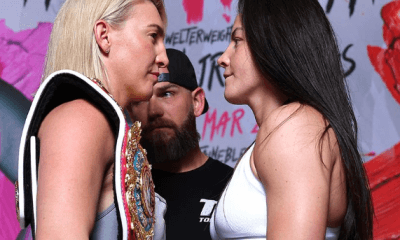
 Featured Articles4 weeks ago
Featured Articles4 weeks agoAvila Perspective, Chap. 319: Rematches in Las Vegas, Cancun and More
-

 Featured Articles4 weeks ago
Featured Articles4 weeks agoRingside at the Fontainebleau where Mikaela Mayer Won her Rematch with Sandy Ryan
-
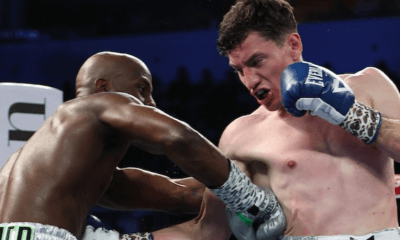
 Featured Articles4 weeks ago
Featured Articles4 weeks agoWilliam Zepeda Edges Past Tevin Farmer in Cancun; Improves to 34-0
-
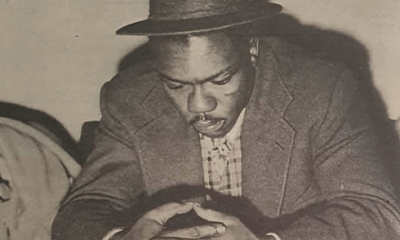
 Featured Articles3 weeks ago
Featured Articles3 weeks agoHistory has Shortchanged Freddie Dawson, One of the Best Boxers of his Era
-
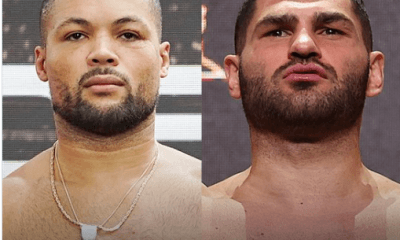
 Featured Articles3 weeks ago
Featured Articles3 weeks agoAvila Perspective, Chap. 320: Women’s Boxing Hall of Fame, Heavyweights and More
-
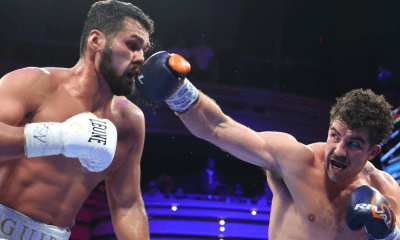
 Featured Articles3 weeks ago
Featured Articles3 weeks agoResults and Recaps from Las Vegas where Richard Torrez Jr Mauled Guido Vianello
-
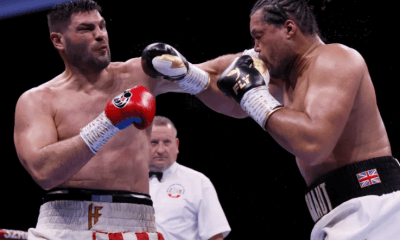
 Featured Articles3 weeks ago
Featured Articles3 weeks agoFilip Hrgovic Defeats Joe Joyce in Manchester
-
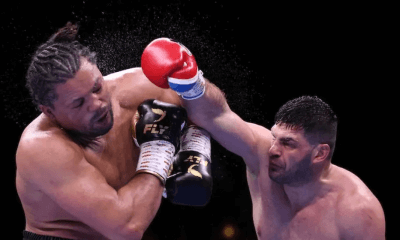
 Featured Articles3 weeks ago
Featured Articles3 weeks agoWeekend Recap and More with the Accent of Heavyweights














